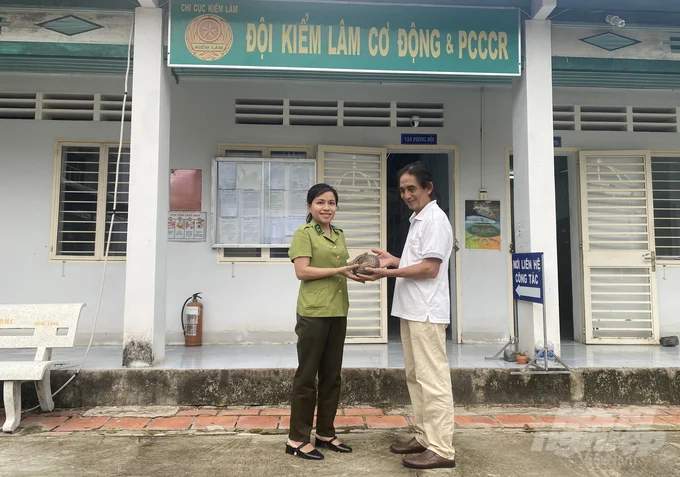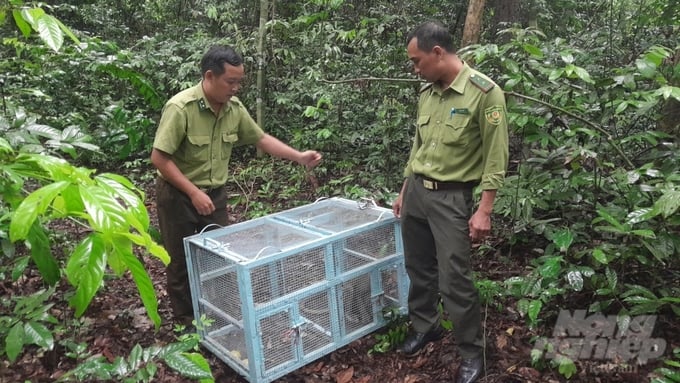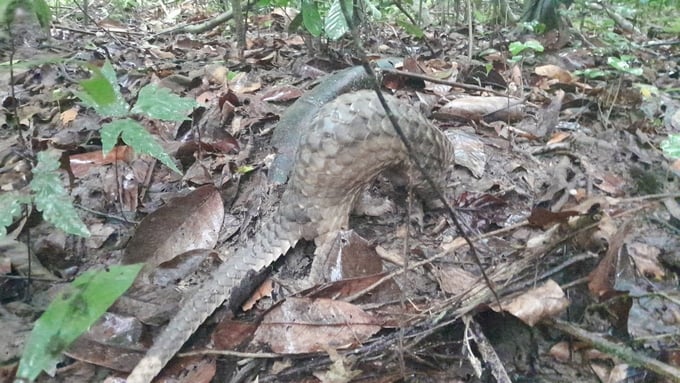May 30, 2025 | 20:13 GMT +7
May 30, 2025 | 20:13 GMT +7
Hotline: 0913.378.918
May 30, 2025 | 20:13 GMT +7
Hotline: 0913.378.918
On July 5, the Tay Ninh Forest Protection Department announced that they had released two Sunda pangolins, with a combined weight of 3.6 kg, which were handed over by local residents, and three wild macaques, weighing a total of 25 kg, which had been causing disturbances in a residential area and were captured by the department.

Tay Ninh Forest Protection Department receives one of the two Sunda pangolins handed over by local residents. Photo: Tran Trung.
According to the Tay Ninh Forest Protection Department, the two Javan pangolins are classified under Group 1B, and the long-tailed macaques are under Group IIB. Both species are listed as endangered and are prioritized for protection.
Mrs Tran Thi Ngan Ha, the head of the Tay Ninh Forest Protection Department, added that the province is home to over 551 species of wildlife in their natural habitats, including rare species such as king cobras, slow lorises (both greater and lesser), deer, fishing cats, wildcats, Javan pangolins, douc langurs, silvered langurs, various monkey species, and birds. Additionally, there are about 300 licensed wildlife breeding facilities in the province. The main species being bred include long-tailed macaques (10,000 individuals), common palm civets (2,300), bamboo rats (730), mouse-deer (50), terrestrial turtles (3,100), and snakes (4,550).

Tay Ninh Forest Protection Department releases wildlife back into nature. Photo: Tran Trung.
In recent years, the illegal trade and violations of regulations protecting wildlife, especially rare species, have continued to occur. In addition to rescue and conservation efforts, the Tay Ninh Forest Protection Department collaborates with relevant sectors to investigate and dismantle transnational organized crime networks related to wildlife. They also work with other agencies to monitor and address illegal advertising and trade of wildlife specimens on electronic information sites.
Since 2019, the forest protection force has rescued and released over 1,250 wild animals back into their natural habitats, voluntarily handed over by local residents. These include long-tailed macaques, pig-tailed macaques, red-faced monkeys, large terrestrial turtles, yellow mountain turtles, clouded monitors, water monitors, Burmese pythons, reticulated pythons, wildcats, pangolins, and various bird species.
Additionally, in 2023, the department coordinated with related forces to inspect, detect, and handle 11 cases of administrative violations involving wildlife, imposing fines totalling over VND 33 million. They confiscated and released 783 wild birds and 10 other animals back into their natural environments.

The recently returned Sunda pangolin. Photo: KLTN.
According to Article 244 of the 2015 Penal Code, anyone who hunts, captures, kills, raises, confines, transports, or illegally trades endangered, rare, or precious animals listed under Group IB or Appendix I of the Convention on International Trade in Endangered Species of Wild Fauna and Flora (CITES) is subject to a fine ranging from VND 500 million to VND 2 billion, or a prison term from 1 to 5 years. In cases where the violation is more severe, the penalties imposed will be even more stringent as stipulated by the law.
Translated by Hoang Duy

(VAN) Vaccinating juvenile pangasius helps reduce disease, antibiotic use, and farming costs, increasing profits for export-oriented farmers in An Giang.

(VAN) Due to a limited supply of workforce and competitive recruitment requirements, businesses struggle to retain talented veterinary human resources.

(VAN) WOAH’s guidance aims to mitigate disease risks through a One Health approach that balances economic, conservation, and public health interests.

(VAN) Ms. Nguyen Thi Dung, Deputy Director of Ngoc Hoang Cooperative, shared about the journey of bringing dragon fruit to Europe, achieving annual revenues in the billions of VND.

(VAN) Bamboo products from Thang Tho Bamboo Cooperative have reached many countries around the world, while also creating jobs for local workers.

(VAN) The Management Board of Con Dao National Park reported that a green sea turtle, tagged in the Philippines, has traveled thousands of kilometers to lay 84 eggs on Bay Canh Islet.

(VAN) Green technology is paving a new path for sustainable aquaculture in the Mekong Delta in particular and across the country in general, helping reduce emissions and adapt to climate change.